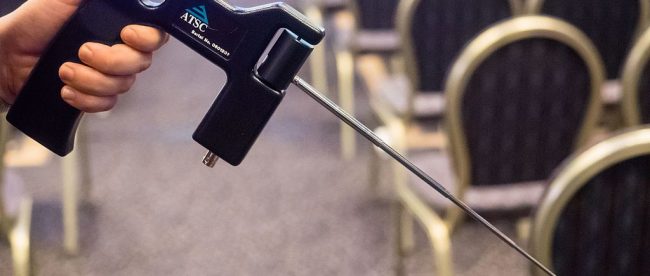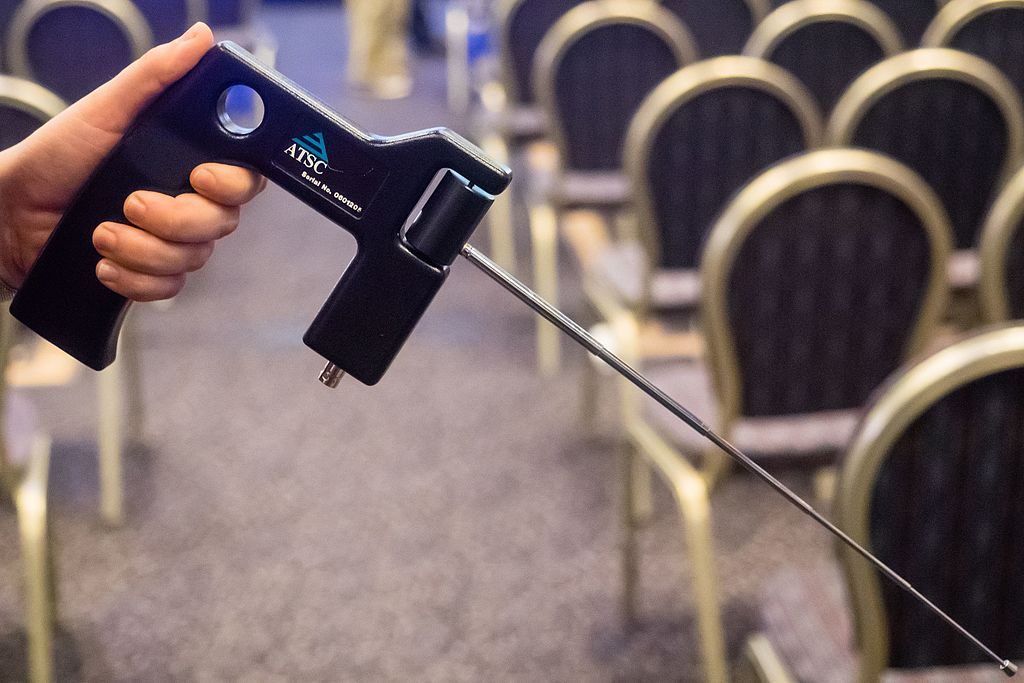The Bomb Detector That Was a Dud


In the fall of 2009, an Iraqi man named Aqeel Yousif Yaqoub ran a take-out falafel shop not far from the Justice Ministry in Baghdad. As locations go, that’s was a pretty good one; not only is there a lot of foot traffic and therefore customers, but it should be a pretty secure area — hardly something to underrate in a de facto war zone. But that October, a bomb went off. Yaqoub, according to the BBC, suffered injuries to his hands and face, and his falafel shop was also damaged.
The bomb should have never gone off, though — it should have been detected. Guards at the Justice Ministry — and for that matter, guards at many other Iraqi institutions — were outfitted with handheld, state-of-the-art bomb detectors (pictured above) called the ADE 651, made by a British company called Advanced Tactical Security & Communications Ltd (ATSC). According to a 2009 report in the New York Times, “ATSC’s promotional material claims that its device can find guns, ammunition, drugs, truffles, human bodies and even contraband ivory at distances up to a kilometer, underground, through walls, underwater or even from airplanes three miles high.” It didn’t even need batteries — it was powered by “electrostatic magnetic ion attraction,” per the Times. (CBS News reported that the device’s training manual instructed users to “shuffle their feet to generate static electricity to make the things work.”)
This miracle device — a bomb detector that was portable, had virtually no upkeep, and could detect seemingly everything and from a distance — seemed like the perfect fit for war-struck Iraq. The Iraqi government agreed, at least; they invested a total of $85 million on thousands of them. Many other nations in the region did as well. And yet, bombing attacks like the one described above continued unabated.
Why didn’t the ADE 651 catch the bombs? Because the device was a fraud.
After more and more bombings occurred, the British and U.S. militaries put the device through extensive testing and concluded that this perfect bomb detector was too good to be true. While security guards did, in fact, find explosives while wielding the ADE 651, that was typically due to the guards’ other training and experience, which allowed them to spot clues that something may be amiss. The ADE 651 itself did nothing — it was, ultimately, no more than a stick with a fancy handle, and no matter how quickly one shuffled his or her feet, no meaningful amounts of electricity would flow through the device. ATSC had not only bilked Iraq out of millions of dollars, but it had also put thousands of Iraqis and others at risk.
Shortly thereafter, the UK banned exports of the device and brought ATSC’s founder, James McCormick, on criminal charges; he was ultimately found guilty of selling fake bomb detectors and sentenced to ten years in prison. Iraq, for its part, didn’t immediately discontinue use of the ADE 651. After the 2009 bombing, General Jehad al-Jabiri, told the Times in the above-linked article “I don’t care about [the labs that did the tests] or the Department of Justice or any of them. I know more about this issue than the Americans do. In fact, I know more about bombs than anyone in the world,” and then blamed the devices’ failures on operator error, saying “you need more training.” Ultimately, though, Jabiri met a fate similar to that of McCormick — per the Guardian, “police sources said Jabiri was paid millions to purchase the ADE 651 and publicly defend it,” and he was similarly convicted and incarcerated.
Bonus fact: In 2010, a U.S. government agency announced the results of a 6-year, $19 billion study to create a better bomb detector than the legit ones available at the time. The best thing they could come up with? Dogs. Per Popular Science, “the most sophisticated detectors [that the Joint Improvised Explosive Device Defeat Organization] could come up with tend to locate only 50% of IEDs in Afghanistan and Iraq. When soldiers are accompanied by bomb-sniffing dogs, that number goes up to 80%. That director, Lieutenant General Michael Oates, told the conference that his organization now focuses on disrupting the use of IEDs, rather than flat-out detecting them…because they haven’t make all that much progress on the detection front.”
From the Archives: A Not-So-Silly Use for Silly String: Portable, low-upkeep, no batteries and… it actually works.
